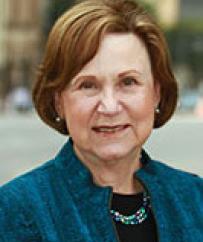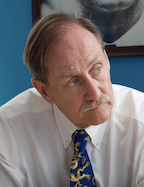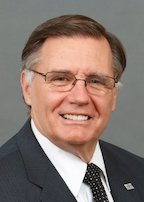Assuming the "time is ripe"—given the number of Los Angeles city officials, elected and appointed, who have been caught up in an FBI investigation of corruption at City Hall—TPR offers its platform to three distinguished, respected, and experienced former public servants to share their collective perspective on how best to reform LA City's corrupted landuse approval process: Rick Cole, former Santa Monica City Manager, Pasadena Mayor, and contributing TPR Editor; S. Gail Goldberg, FAICP, former Planning Director of San Diego and Los Angeles and Executive Director of Urban Land Institute Los Angeles; and, Bud Ovrom, former LA City Deputy Mayor for Economic Development, LADBS General Manager, and CRA/LA CEO. The trio assert that at the root of corrupt dealmaking and LA's landuse woes is a failure to plan.
Gail Goldberg’s oft-quoted observation captures any LA City Planner’s challenge, “In most cities, the value of land is based on the land use designation and the zone. But in LA, the value of land is based on what you think you can get the zone changed to.” Instead of a process that demands case-by-case exceptions to outdated zoning codes or superficial knee-jerk reforms—the trio advocate for a comprehensive package of policies that will protect existing residents from slipshod spot zoning and displacement while making room for the next generation to pursue their dreams for a better life. To facilitate such reform, Ovrom, Cole, and Goldberg recommend taking inspiration from the federal base closure approach that finally broke the political deadlock over eliminating unneeded military installations: set up a Commission to study what needs to be done and commit to an up or down vote on its recommendations. That Los Angeles City commission, they suggest, would need to address both the process of inclusive planning and ways to protect the integrity of plans once adopted.

S. Gail Goldberg
“Superficial reforms to curb corruption might temporarily quell the outrage -- The real fix is to do real planning… To fail to plan is to plan to fail.”
No matter how tough the penalties, you will never devise a law that will keep bees away from honey.
Given the recent guilty pleas and indictments, the various reforms proposed by Los Angeles City Council President Nury Martinez and by Councilmember David Ryu to strengthen the City’s oversight against corruption are overdue. Martinez wants to modernize the zoning code and sharply limit exceptions for developers. She has also proposed bringing megaprojects directly to the Council, bypassing the aptly named PLUM Committee (the hive of the illegal developer enticements that brought down Councilmembers Huizar and Englander). Ryu supports creating an office of “Anti-Corruption and Transparency” to investigate fraud, corruption and misconduct and wants a charter amendment on the ballot to strip the Council of the power to override the City Planning Commission.
If enacted and implemented by the Council and voters, these reforms would go a long way toward discouraging the kind of brazen scandal that is rocking City Hall. But until land use planning in Los Angeles is based on smart public policy, not raw political power, developers will be irresistibly drawn to find ways to influence politicians, lawfully or not.
The City’s current zoning laws and development approval processes were devised for a vast suburban sprawl anchored to the automobile. Those laws were also shaped by overt racist impulses to keep “those people” out of white neighborhoods. But every systematic effort to reform them has been frustrated. On the surface, the explanations are that it is too hard to revise the status quo – it would take too long, it would be too costly, it would stir up too much political trouble. But the real reason is that the majority of the City Council keep the flawed system in place because of the power it gives them.
Too bad that the failure to plan has kept the City from building adequate housing (a person earning the median wage in Los Angeles would have to work 61 hours a week to afford a median-priced one-bedroom apartment in the city, according to a recent Zillow study.) Too bad this failure has reinforced the racial and economic segregation that fuels the harsh Darwinian struggle of gentrification and displacement as young people vie with longtime residents for decent places to live. Too bad that this failure leads directly to grotesque corruption, including Councilmembers jetting off to Las Vegas on the private plane of a developer to bask in free booze, sex and high stakes gambling in exchange for land use approvals.
The reality is that Los Angeles has 16 Directors of Planning – but only one has the title. The fifteen Councilmembers each have the power to grease the way for projects in their districts – or halt them altogether. Because the city’s codes are so antiquated, rezoning and exceptions are routinely granted for specific projects – if the developer can navigate the City’s politicized approval processes.
His words have been given a sinister cast by Federal prosecutors, but an influential former city official was simply stating facts when he told a Chinese developer in a wiretapped phone call, “If you are in the PLUM committee, but Huizar does not put you on the agenda, then, your project will not see the light of day for a long time, because it’s up to the chairman whether the agenda is your project or not. . .his power is so great that even if Department of City Planning approves, and the City Planning Commission makes all the changes, such as changing or reducing the number of your units, etcetera, PLUM, which stands for Planning and Land Use Management, the committee chaired by Jose can still completely reverse everything.”
That is obviously not the way to plan a great city. Equally obviously, It ensures that campaign cash, lobbying, favors and outright bribery will influence what gets built and where.
There is no quick and easy fix. Superficial reforms to curb corruption might temporarily quell the outrage -- until the next set of scandals and indictments. But unless we replace our outdated zoning, we still won’t have affordable housing and workers will still have to endure long commutes to their jobs. Businesses will still struggle to retain skilled workers who can’t afford to live here. New residential and commercial building will still be held hostage to convoluted and capricious processes that drive up costs and make us less competitive with other regions. Neighbors will still have to fight City Hall to stop ill-conceived projects and developers will still find ways to pay to play. To fail to plan is to plan to fail.
The real fix is to do real planning. To spend the time and money to plan for adequate new housing and to put new commercial development where it can be served by our expensive investments in public transit. To involve our diverse communities in a collaborative effort to plan for a more equitable, prosperous, livable and environmentally sustainable Los Angeles. To ensure that instead of allowing individual projects that make little sense, we plan comprehensively to have adequate schools, parks and transit for new growth. To protect existing residents not from change, but from slipshod spot zoning and displacement while making room for the next generation to pursue their dreams for a better life.
Other cities are pointing the way, but Los Angeles studiously averts its gaze. Miami adopted a “smart code” to ensure new building is appropriately scaled to its context across the city. Minneapolis, Austin, and now Portland have revamped zoning to promote more affordable infill housing. The efforts by LA Planning Director Vince Bertoni to update the woefully outdated Community Plans and zoning code have never been given the support needed to overcome political gridlock. Currently, 24 of the 35 plans haven’t been updated in twenty years or more. The oldest is 32 years out of date.
Given the mess of pre-COVID traffic and post-COVID economic misery, what could force Los Angeles to finally embrace the need for real planning for a 21st Century future? One might think the current unfolding scandal would finally force elected officials to act, lest they be punished by the voters. One would be wrong. That is not because the incumbents are evil – or corrupt. It is because public outrage fades and few politicians willingly surrender power.
Instead, the public will need to focus not on the lurid details of individual corruption, but on the much more serious failure to plan in the second largest city in America. Organized neighbors, developers, civic leaders, academics and activists will need to set aside the differences that keep them divided and come together to demand comprehensive change.
One route might take inspiration from the base closure approach that finally broke the political deadlock over eliminating unneeded military installations. Congress set up a Commission to study what needed to be done – and committed to an up or down vote on its recommendations. A similar group of diverse stakeholders could propose a comprehensive package to reform land use planning in Los Angeles. To avoid their recommendations being shunted off to die in committee, the entire package would have to come to a simple up or down vote by the Council.
Such a group would have to be broad-based, titled neither toward real estate interests nor affluent homeowners. It would need to focus on what’s best for the future of all the city’s residents, not just those with the most clout under the current system. It would have as its goal not just reducing corruption, but enhancing the quality of life and standard of living of the city’s four million people.
Every day in Los Angeles, people strive for a better tomorrow, whether they are advocating for better jobs in South LA, more affordable housing in West LA, safer streets in East LA or better transit in the Valley. They care about racial equity, fighting climate change and ending homelessness. That’s what real planning is all about. With the world coming to LA in 2028, the time is now to lay the foundation for a better-planned future for all.
- Log in to post comments





